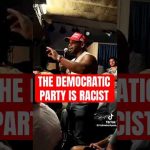President Trump is once again making headlines, this time with a renewed emphasis on improving election security. He is pushing for the implementation of voter ID laws, promising an executive order to mandate them. This move comes hot on the heels of a recent appellate court ruling that struck a significant blow to his tariff policies. It seems the President is undeterred and ready to fight back, as he feels that securing elections is as important as protecting the economy.
In a spirited response to the court’s ruling, Trump expressed his belief that the absence of tariffs could lead to devastating consequences for the nation. He argued that the trillions of dollars gained from these tariffs have played a vital role in maintaining the country’s military power and overall stability. Interestingly, he even thanked a Democrat judge who sided with him, highlighting a rare moment of cross-party appreciation in today’s politically charged atmosphere. It appears that Trump’s strategy is to rally his supporters around the idea that the judicial system is not always in alignment with what is best for America.
In the midst of this turbulence, Peter Navarro, Trump’s trade guru, labeled the appellate decision as a “partisan injustice” rooted in the political affiliations of the judges. With six out of seven judges being Democrats, Navarro expressed frustration at what he sees as a bias directed against Trump and his policies. He mentioned the intervention of twelve blue states against Trump’s tariffs, calling them a conniving effort to protect small import companies that have been benefitting from cheap imports. For him, this is a clear battle of ideologies within the country.
As if this saga couldn’t get any juicier, the case is expected to reach the Supreme Court, where the stakes couldn’t be higher. The White House is optimistic that they will prevail, arguing that the staggering $1.2 trillion trade deficit constitutes a national emergency justifying these tariffs. However, opponents argue that the ruling from the appellate court suggests a lack of legal authority to enforce such tariffs under the Emergency Economic Powers Act of 1977, which, interestingly enough, doesn’t even mention tariffs.
Despite the uncertainty surrounding the legal ramifications of Trump’s tariffs, economic experts remain cautiously optimistic about the American economy’s resilience. They predict that if the Supreme Court sides against Trump, the initial market reactions may involve some turbulence. However, as the dust settles, the broader picture shows that the U.S. economy continues to show strength. With consumer buying power holding strong and the administration’s policies still yet to fully kick in, there is hope that the markets and economy will recover well.
In the end, President Trump’s call for stricter voter ID laws, juxtaposed with the ongoing tussle over tariffs, might just show that while the President is facing headwinds, he’s not backing down. His focus on maintaining security in both elections and trade reflects a larger philosophical battle about the identity and direction of the nation itself. As we watch these stories unfold, one thing is sure: the political and economic arenas in America are anything but dull!




